
Caring With Open Hearts, Hands, and Minds
Nursing Annual Report 2024


Nursing Annual Report 2024
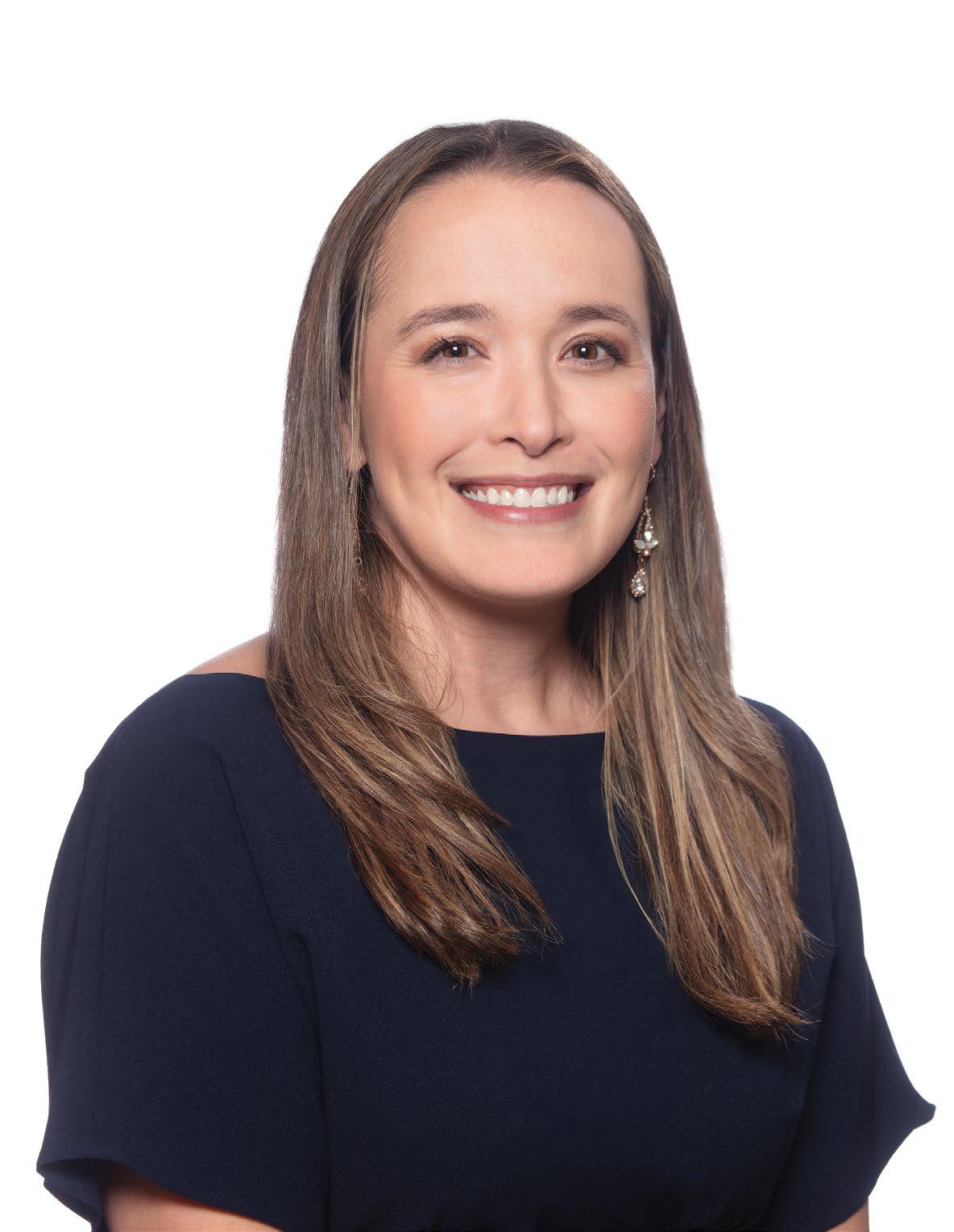
Christine Fahs, MSN, RN, CCRN
Stanford Medicine Children’s Health recognized the Patient Care Manager of PCU 400 during the 33rd Annual Employee Achievement Awards.
Although Christine Fahs has been the manager of PCU 400 for only three years, her dedication to open and honest communication has quickly fostered a culture of trust and collaboration within the unit. She is known for her empathetic leadership style and cultivating a supportive team environment. Under Christine’s guidance, PCU 400 has achieved remarkable staff retention rates, demonstrating her ability to inspire and motivate her team. Christine’s exceptional contributions have significantly enhanced the efficiency and effectiveness of her unit and made a lasting impact on the broader hospital community. Christine has been a nurse for 13 years and began her career as a new grad in our Pediatric ICU. She truly embodies the spirit of leadership, leading by example with unwavering dedication.
“I am a part of an amazing team on PCU 400. Together we are all focused on the patients we serve and our connection to each other. It is our human connection that makes PCU 400 a great place to work.”
The Ninth Annual Nightingale Awards honored over 200 exceptional nurses at Stanford Medicine Children’s Health. Inspired by Florence Nightingale, this annual event celebrates the extraordinary achievements of bedside nurses, nurse leaders, and team members. Congratulations to the 18 Nightingale Award recipients for their unshakable commitment, dedication, and compassion, profoundly impacting patients and families.
2024 Nightingale Award honorees:
• Clinical Excellence—Courtney Rossi (NICU)
• Emerging Talent—Emily Wolfe (PCU 300)
• Eminence Award—Jennifer Vargas (PCU 400)
• Excellence in Advocacy—Jasmine Qureshi (NICU)
• Excellence in Community Outreach—Vincent Pena (CPE&I)
• Excellence in Innovation—Marlene Alcantara (Operating Room)
• Excellence in Mentoring—Linda Khiev-Louie (REI Clinic)
• Excellence in Nursing Leadership—Sujata Sharma (ICN)
• Excellence in Precepting—Joshua Tafoya (Respiratory Therapy)
• Excellence in Quality, Safety, and Improvement— Erica Keesis-Segura (NICU)
• Excellence in Research—Jessica Nagra (CPE&I)
• Excellence in Teamwork—Patient Care Unit 300
• Friend of Nursing—Estela Luna (Maternity)
• Friend of Nursing—Physician—Matthew Cranshaw (Neonatology)
• Innovation and Improvement (APP)—Audrey Moore (NICU)
• Preceptor of the Year (APP)—Monica Mafla (CVICU)
• Rising Star (APP)—Amy Ardaya (CVICU)
• Exemplary Clinical Practice Award (APP)—Cathy Costaglio (Urology)
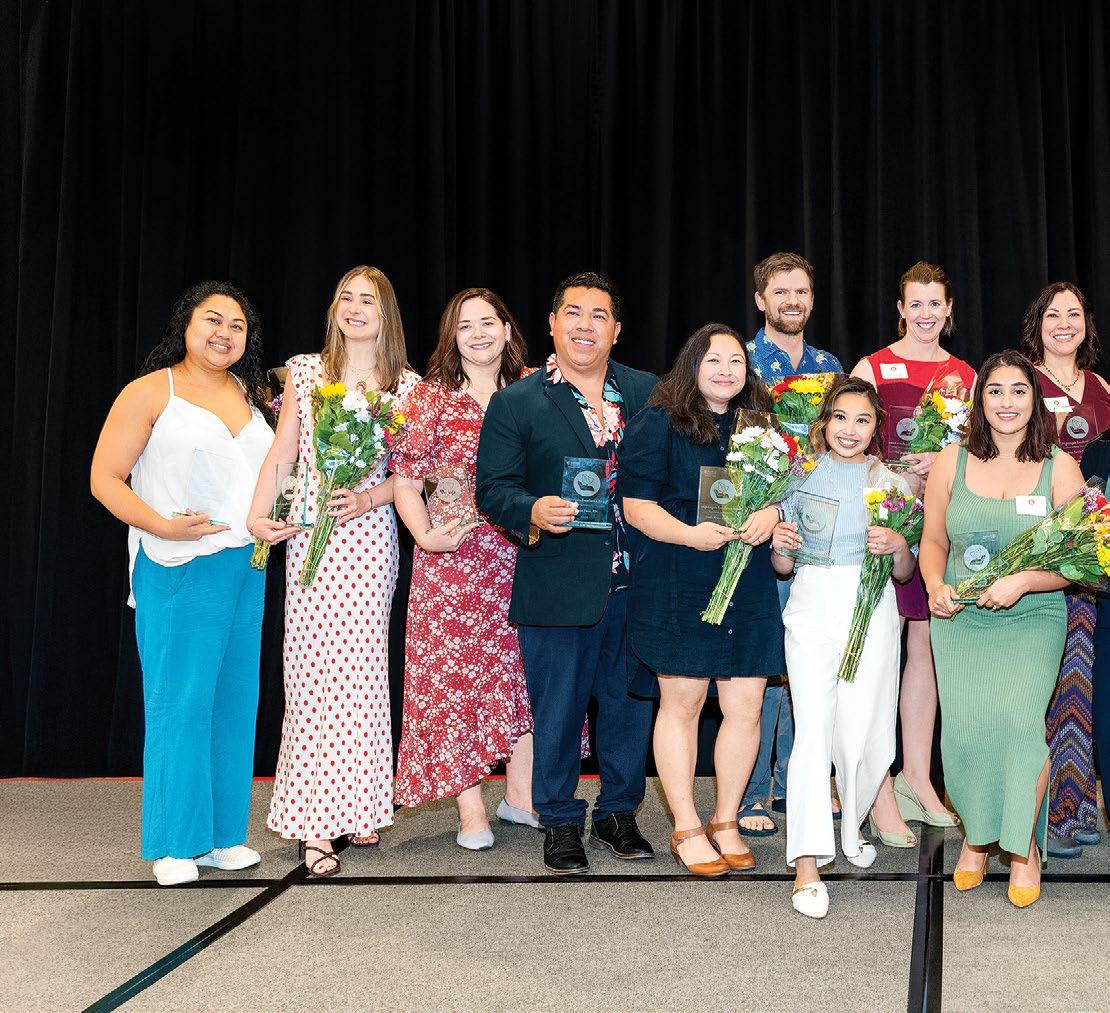
2024 Nightingale Award honorees
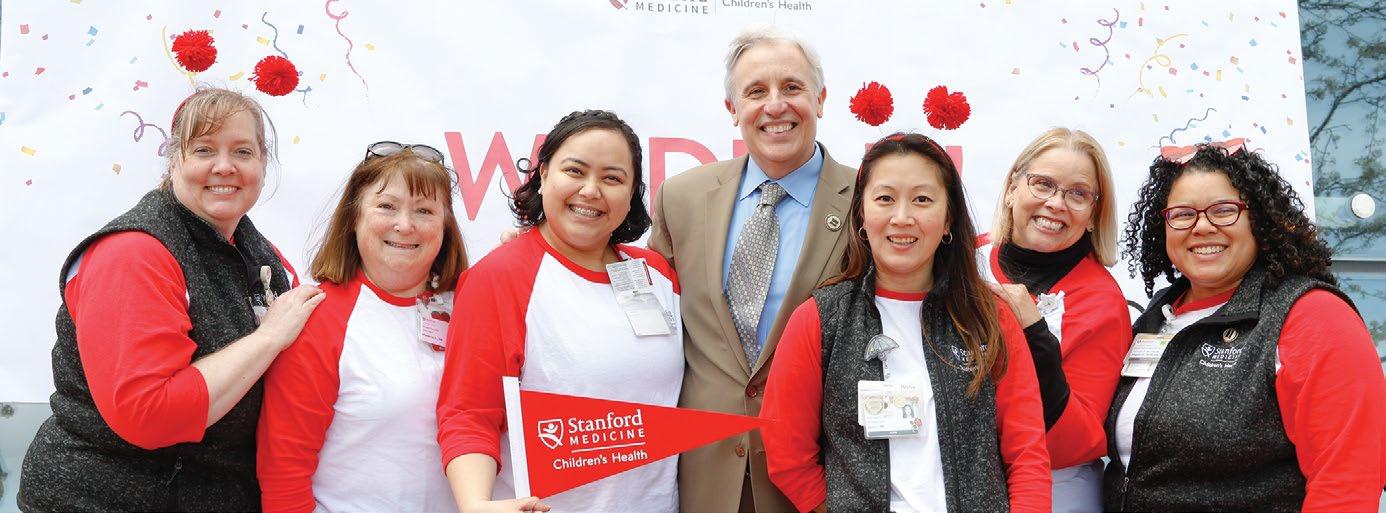
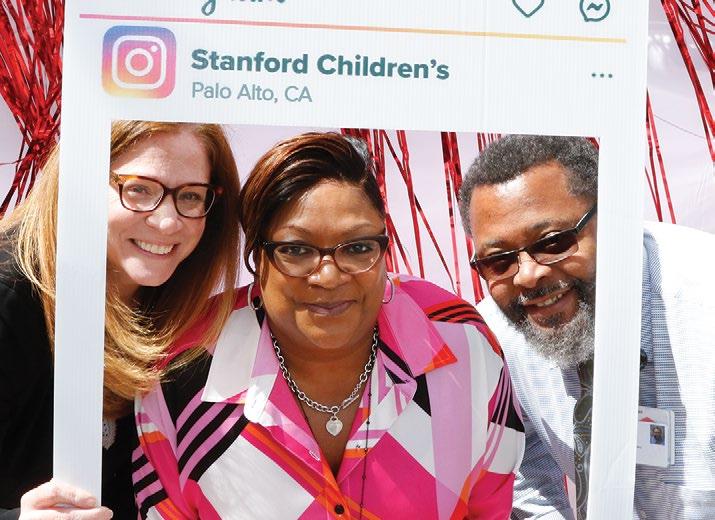
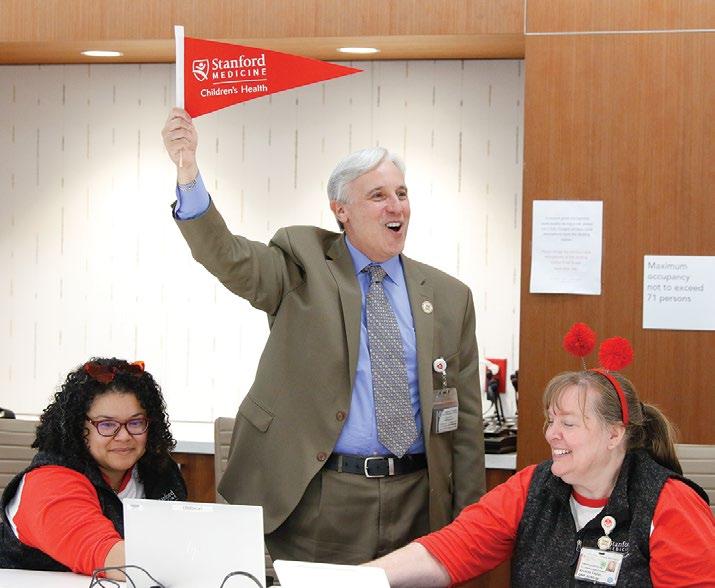
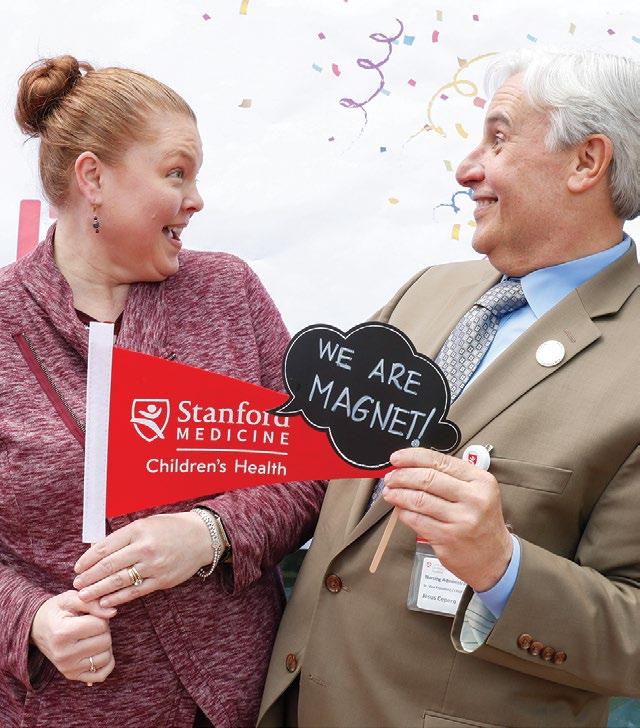
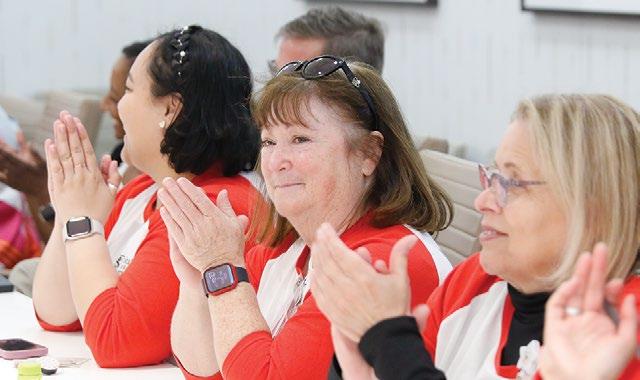

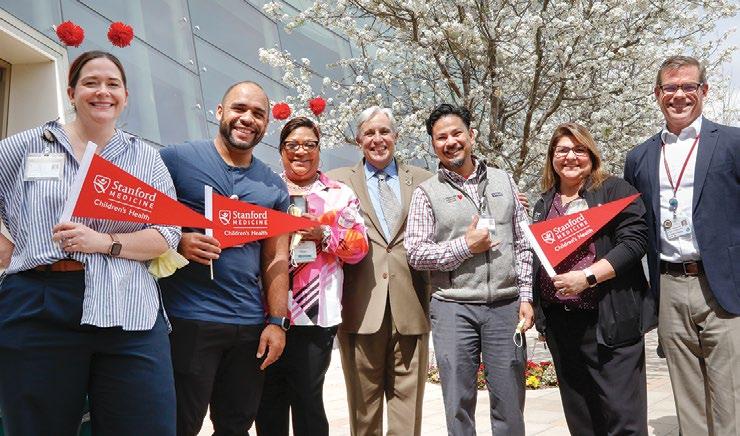

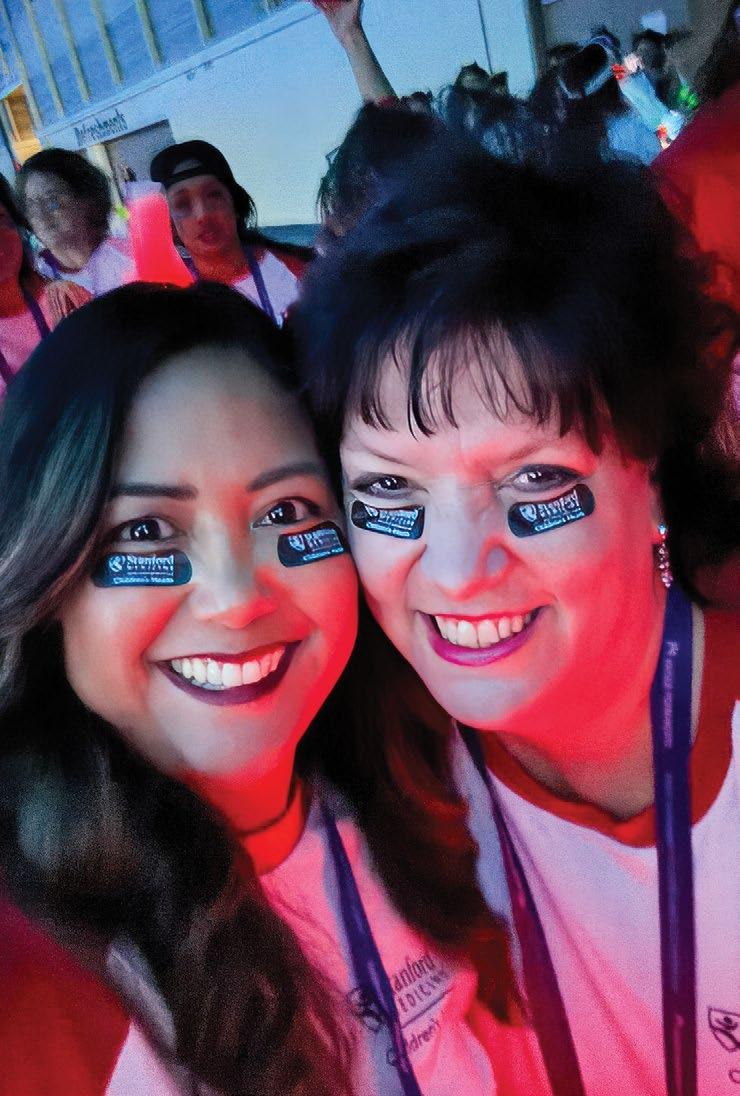
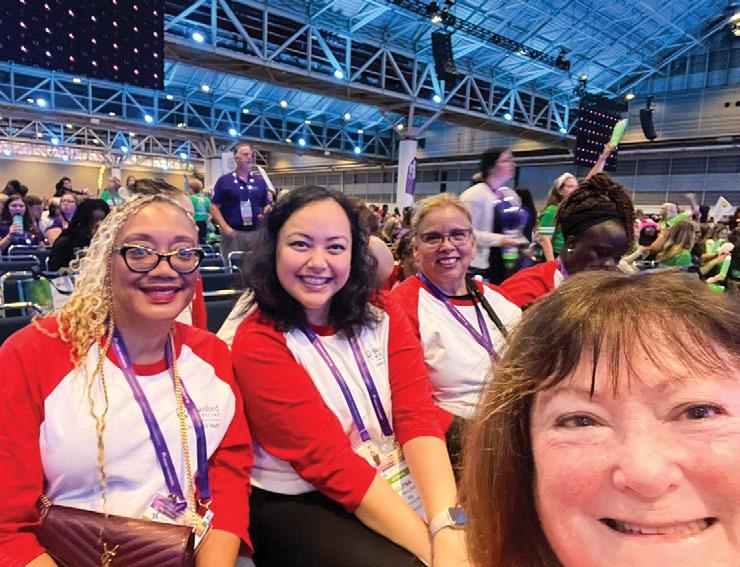
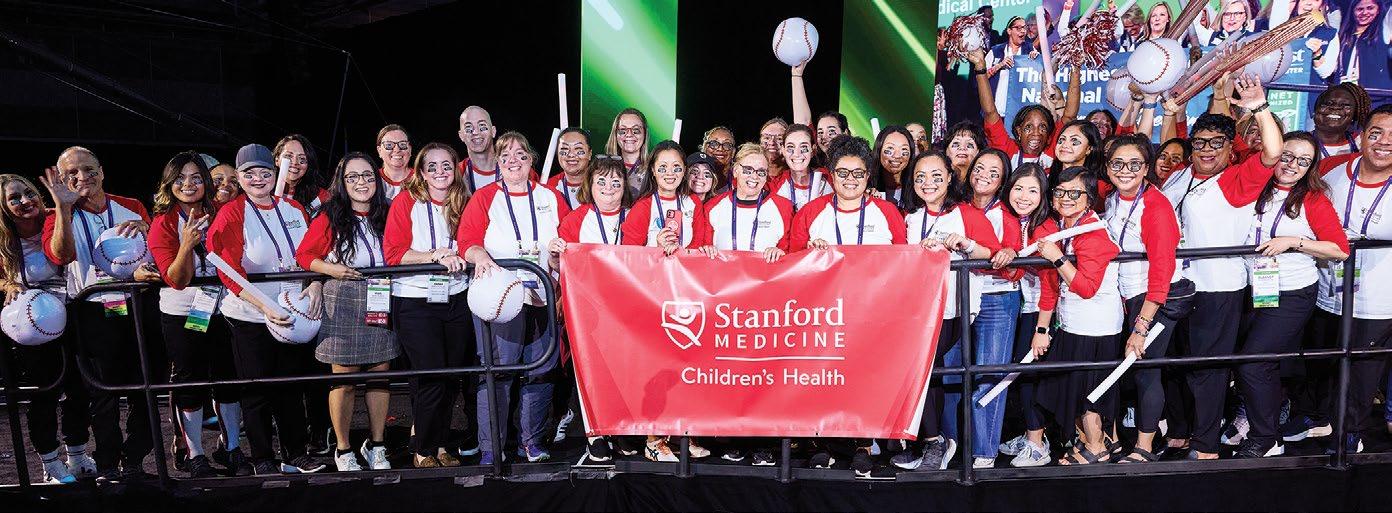
A team of 50 Stanford Medicine
Children’s Health nurses had the distinct honor of attending the American Nurses Credentialing Center’s National Magnet Conference in New Orleans to celebrate achieving our second Magnet designation. The team joined more than 13,000 other nurses who had gathered in the Big Easy for the three-day event showcasing nursing innovation and best practices.
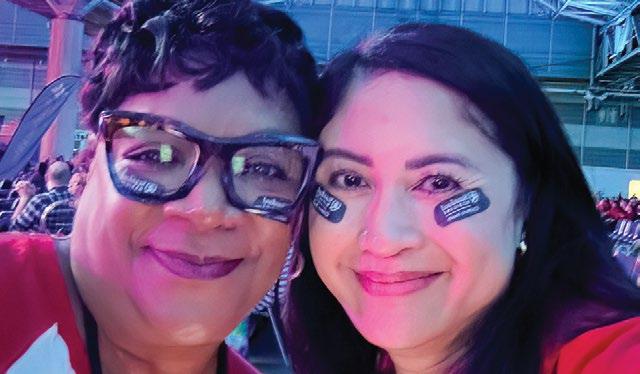
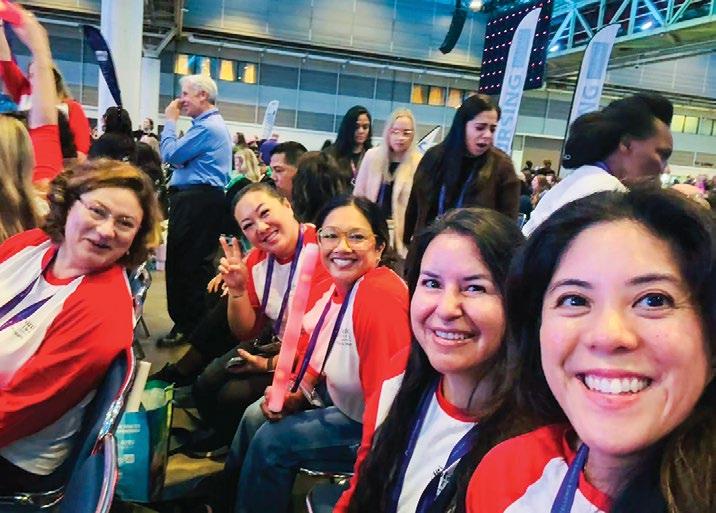
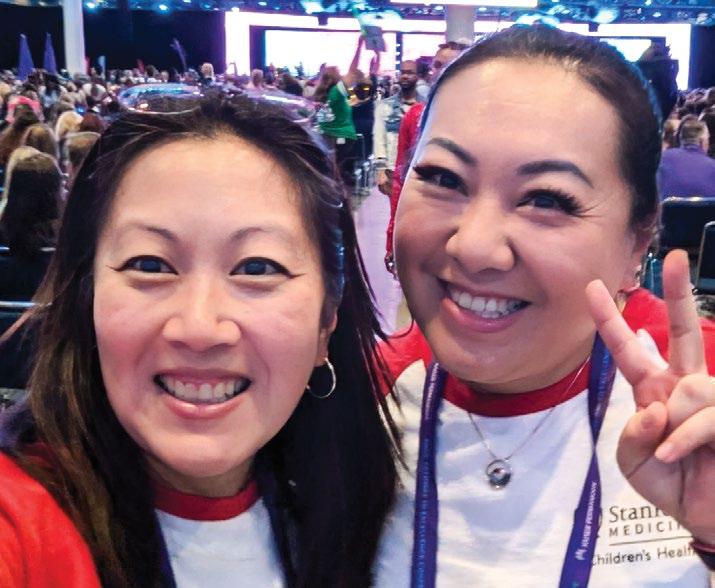

At Stanford Medicine Children’s Health, we celebrate Transformational Leadership, highlighting its significant impact and vital role within our organization and beyond.
Each year, we proudly shine a spotlight on the incredible ways our nurses and staff exemplify Transformational Leadership in support of one another and our patients. Our vision of Transformational Leadership embodies knowledgeable innovators who convey a strong sense of advocacy. While this concept is designed to uplift leaders within our hospital, it also presents a powerful opportunity for everyone to carry these qualities into our broader communities. Anyone can be a transformational leader by demonstrating knowledge, innovation, and a forward-thinking approach to advocating for and supporting others. Throughout our 2024 Nursing Annual Report, we will draw special attention to key stories and moments of Transformational Leadership, aiming to inspire you to discover opportunities to exhibit these leadership qualities in your communities throughout the year and beyond.
“Just as ripples spread out when a single pebble is dropped into water, the actions of individuals can have far-reaching effects.”
—Dalai Lama
Stanford Medicine Children’s Health serves a diverse and multicultural patient population. A new qualified bilingual staff program ensures that all patients have greater access to language-concordant and equitable care.
Effective communication between clinicians and patients is essential. Language discordance, which occurs when a patient’s primary language is different than the primary language of the health care facility, can lead to misunderstandings, lower satisfaction, and worse outcomes. Our Qualified Bilingual Staff (QBS) program addresses these issues by certifying bilingual clinicians at national standards in a Language Other Than English (LOTE). To participate, clinicians must take a language assessment. Those who successfully pass receive a badge sticker, signifying that they can conduct
clinical conversations in a specific LOTE. Since 2020, 283 clinicians across 25 languages have been certified. QBS do not replace medical interpreters, rather they enhance our ability to deliver language-concordant care.
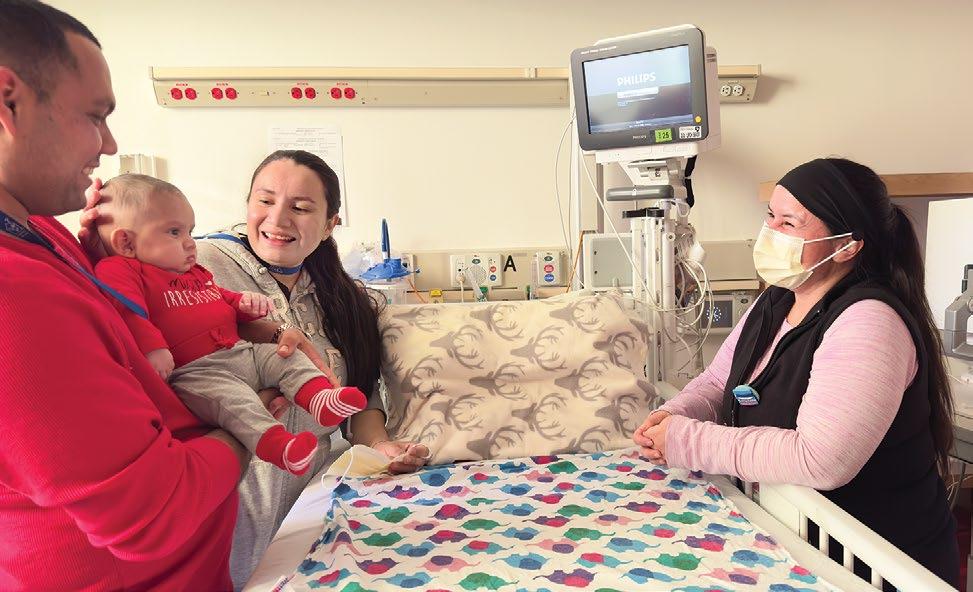
Imagine a patient or family member who primarily speaks Spanish. Communication barriers decrease when a skilled bilingual nurse or interpreter is at their side. Engaging with patients in their primary language paves the way for a deeper understanding of their needs and preferences. This rich cultural connection empowers QBS to deliver respectful and personalized care. Language-concordant care enhances communication and strengthens human connection. Patients feel more at ease and confident, fostering stronger rapport and trust in their care team.
Patricia Gomez, BSN, RN, Peds-BC, Clinical Nurse IV, Acute Care Float Team, a QBS in Spanish, recently helped a family who, due to language barriers, had been wrongly perceived as reluctant to hold their baby. The family was told during rounds that their child needed to remain on monitors to check their heart rhythms closely. However, the family understood this to mean that the child should not be held to avoid interrupting the monitoring process. Patricia explained their child’s monitoring needs and demonstrated how to hold their baby safely, bringing immense comfort to the parents.
Qualified bilingual staff are invaluable in elevating the quality and efficiency of patient care. By breaking down language barriers, they make health care more accessible and effective for our diverse patient population, exemplifying the spirit of inclusivity and equity that our organization proudly upholds.
At Stanford Medicine Children’s Health, frontline nurses are combating the health care industry’s significant contribution to waste, bridging health and environmental stewardship.

Understanding the intrinsic connection between climate and health, our Sustainability Department has collaborated with departments around the hospital to form multidisciplinary Eco Teams. These teams focus on developing and implementing solutions for sustainable operations.
Since January 2024, the PICU Eco Team has diverted 14,000 pounds of waste from landfills. Meanwhile the Perioperative Eco Team has recycled 2,200 pounds, kept 135 pounds out of landfills, and earned $15,000 in rebates.
In 2024, the Sustainability Department created a fellowship program to support staff projects to reduce waste. PICU Eco Team members Morganna Johnson, BSN, RN, and Noelle Gross, BSN, RN, were selected as the inaugural awardees for their specialty bedside cart designed to minimize waste while maintaining exemplary patient care. Excess supplies in isolation rooms must be discarded when the patient leaves. The streamlined specialty carts are
stocked with the supplies that a PICU RN would typically need, removing excess and diverting thousands of dollars from landfills.
Our Eco Teams reduce waste, lower greenhouse gas emissions, and educate colleagues across the organization. This culture of empowerment aligns with our commitment to sustainability and allows our nurses to drive innovation and create meaningful impact, leading to cost savings and a healthier planet.
“Stanford Medicine Children’s Health nurses exemplify how healing people and the planet can go hand in hand, creating a better world for future generations.”
—Christine Foster, CHSP, Director of Sustainability
In 2024, the Heart of Nursing Award was launched through a sponsorship with the Association of Auxiliaries for Children Endowment. The award embodies our nursing vision, “Caring with Open Hearts, Hands, and Minds,” by supporting nurses in building resiliency and uplifting communities. It offers up to $5,000 per recipient or $15,000 per team for community health care activities aligned with Healthy People 2030 and U.N. Sustainable Goals. This enables significant contributions to care for underserved children and mothers.
Additionally, up to $5,000 is available for projects that enhance clinical education and improve patient and family experiences. For more information on the Auxiliaries Endowment Grant, please see page 18.
The 2024 awardees (pictured from left): Natasha Rajkumar (CPE&I), Rachel Blair, and team awardees Darcy Swisher (PICU), Kyle Parker (PICU), Amy Haas* (Critical Care Transport), Katheryn Mikolic* (Patient Placement), and Kindell Glinkowski* (PICU). *Not pictured

Mary Elizabeth Hartnett, Department of Ophthalmology: Wide-Angle Optical Coherence Tomography to Provide Care to Infants with Blinding Eye Diseases
Mari Kurahashi, MD, and Elizabeth Reichert, PhD, Division of Child and Adolescent Psychiatry, Department of Psychiatry and Behavioral Sciences: Advancing Pediatric Mental Health Equity and Outcomes via Digital, On-Demand Parenting Psychoeducational Classes
Kathryn Czepiel, Division of Gastroenterology, Hepatology and Nutrition: Improving Access to Pediatric Living-Donor Liver Transplantation
Lynn Koegel, Psychiatry and Behavioral Sciences: Using Artificial Intelligence (AI) to Improve Social Conversation in Autistic Adolescents and Adults
Lisa Kohne, Betty Irene Moore Outpatient Heart Center: Service Recovery
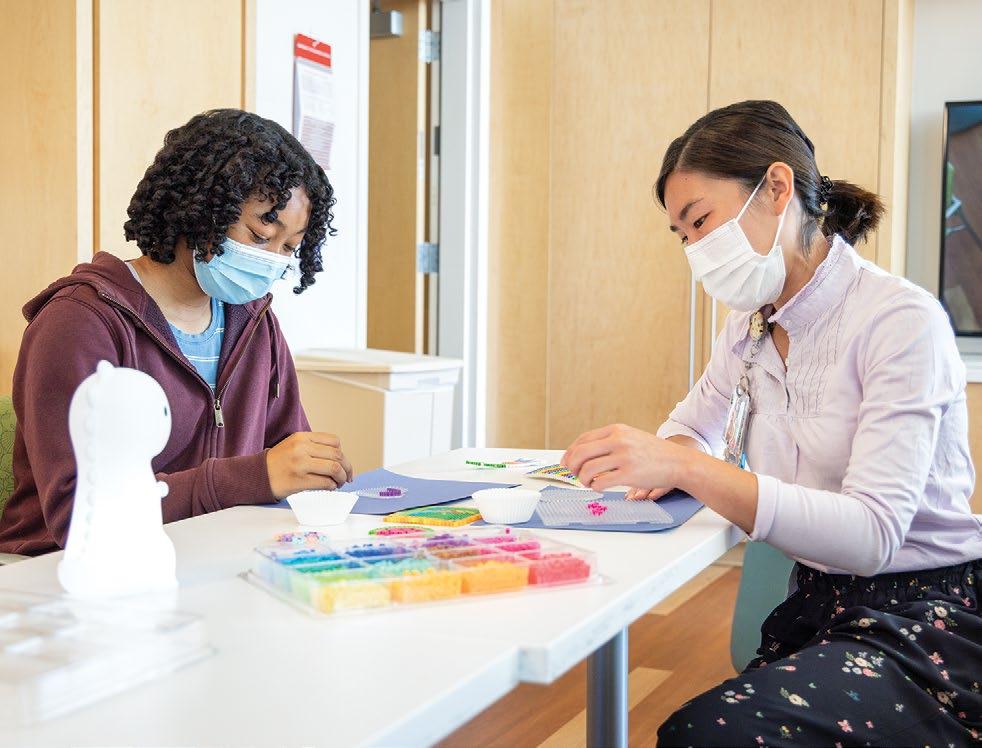
Laura Shanahan, NICU: NICU Milestone Committee Craft Project
An Diep, Novel Interventions in Children’s Healthcare (NICH): Special Purpose Funds Grant Request
Tom Caruso, Sam Rodriguez, and Ellen Wang, Pediatric Anesthesiology: LPCH/Auxiliaries
Endowed Fund for the Chariot program
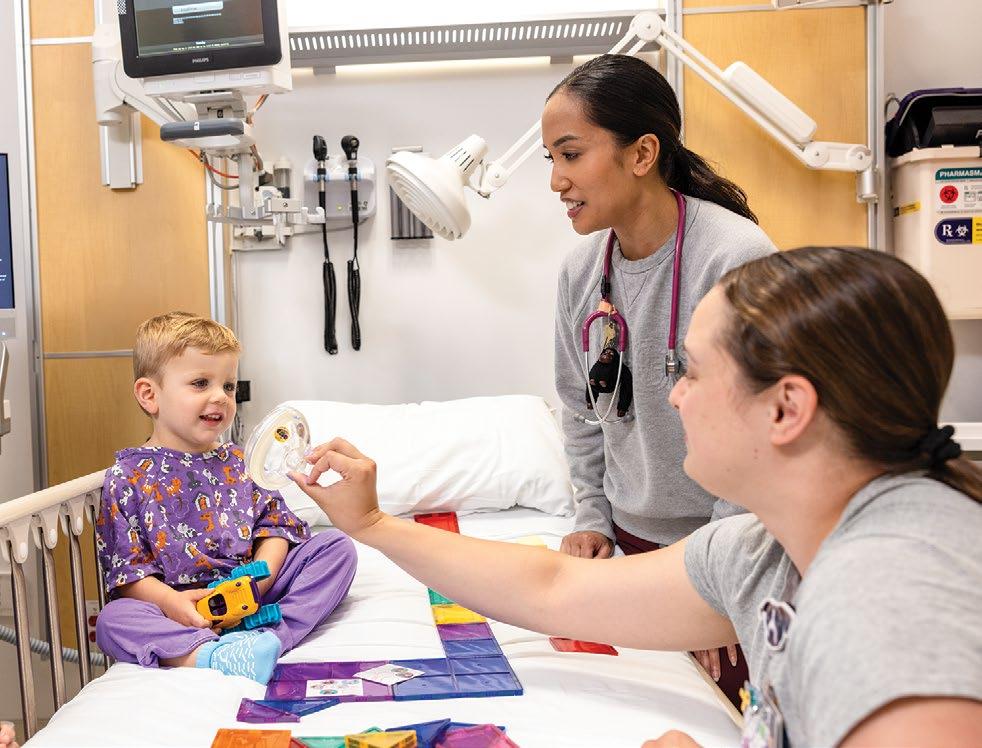
Quality of life is vital for all patients, regardless of diagnosis. Palliative care conferences provide important training and expert perspectives on caring for patients and their families throughout the course of serious illness.
In October, a dedicated group of Stanford Medicine Children’s Health nurses partnered with the Stanford Medicine Division of Quality of Life and Pediatric Palliative Care to host an End-of-Life Nursing Education Consortium (ELNEC) conference titled “Advancing Perinatal and Pediatric Palliative and End-of-Life Care with ELNEC.”
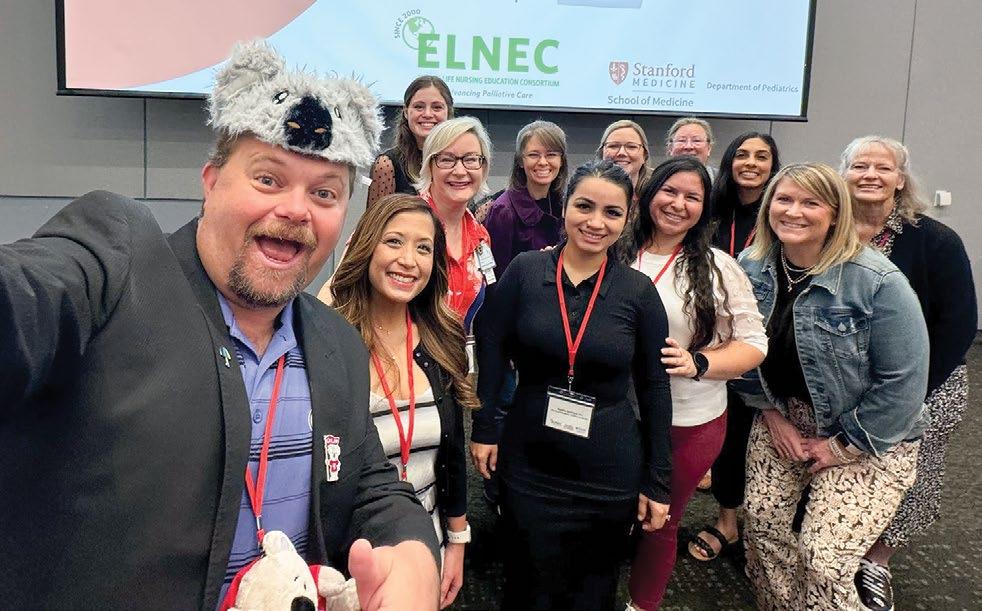
Palliative Care Committee at ELNEC Conference
ELNEC is an American Association of Colleges of Nursing (AACN) recognized initiative focused on improving palliative care through education and training for a wide range of nursing professionals across
a variety of specialties. The program also welcomes other health care professionals (HCPs), emphasizing the importance of collaborative learning to improve patient care.
The event drew 148 attendees and aimed to elevate the standards of palliative and end-of-life care both nationally and globally. The twoday training featured a diverse panel of interdisciplinary speakers, including physicians, nurses, social workers, chaplains, and other HCPs.
A particularly inspiring segment was the parent panel, where bereaved parents shared their personal experiences. This year also saw the addition of a nurse panel and a Palliative Care Resource Fair, organized by the Palliative Care Shared Governance Council.
A notable shift with this year’s training was the collaboration with the Division of Quality of Life and Pediatric Palliative Care. Initially funded through an endowment grant, this service has now matured into a fully integrated division within the Stanford Medicine Department of Pediatrics, with interdisciplinary partnership embedded at Stanford Medicine Children’s Health. Linda Ritter, RN, CPON, a pediatric oncology nurse coordinator and co-chair of the ELNEC conference, welcomes the department’s expansion, recognizing its significant positive impact on patient care.
“This enhancement allows Stanford Medicine Children’s Health to be true to its mantra—that we provide excellent and comprehensive care.”
Offerings like the ELNEC conference reaffirm the organization’s commitment to innovation, excellence, and compassionate care. They foster a community dedicated to improving the quality of life for patients and their families during challenging times.
Stanford Medicine Children’s Health’s Advanced Practice Provider Fellowship and Nurse Residency Programs receive prestigious Accreditation with Distinction designations.
In an outstanding display of excellence, both the Stanford Medicine Children’s Health Advanced Practice Provider (APP) Fellowship Program and the Vizient/AACN Nurse Residency Program™ – Stanford Medicine Children’s Health have proudly received Accreditation with Distinction from the American Nurses Credentialing Center’s (ANCC’s) Accreditation Program. These honors signify the highest level of accreditation recognition available, highlighting the extraordinary quality and rigorous standards upheld by our APP fellowship and nurse residency programs. The Stanford Medicine Children’s Health APP Fellowship program provides education, training, and support for our new graduate nurse practitioners and physician assistants, ensuring that they transition seamlessly into their roles caring for medically complex pediatric patients. Similarly, the Vizient/ AACN Nurse Residency Program™ – Stanford Medicine Children’s Health supports new graduate nurses in their transition from advanced beginners to competent professional nurses. This is the nurse residency program’s second accreditation and first time achieving the newly created Accreditation with Distinction designation.
The ANCC’s Accreditation Program elevates the standard for transition to practice programs. The rigorous, peer-reviewed accreditation process examines program leadership, program goals and outcome measures, organizational enculturation, and practice-based learning. The achievement of Accreditation with Distinction demonstrates our extraordinary commitment to supporting APP fellows and new graduate nurses at Stanford Medicine Children’s Health.
These remarkable achievements would not have been possible without the unwavering dedication and collaboration of our entire Stanford Medicine Children’s Health team, and notably Raji Koppolu, MSN, MSL, BSN, BS, CPNP-PC/AC, RN, NPD-BC, FAAN, Manager of Advanced Practice Professional Development, and Kristina Rivera, DNP, MA,
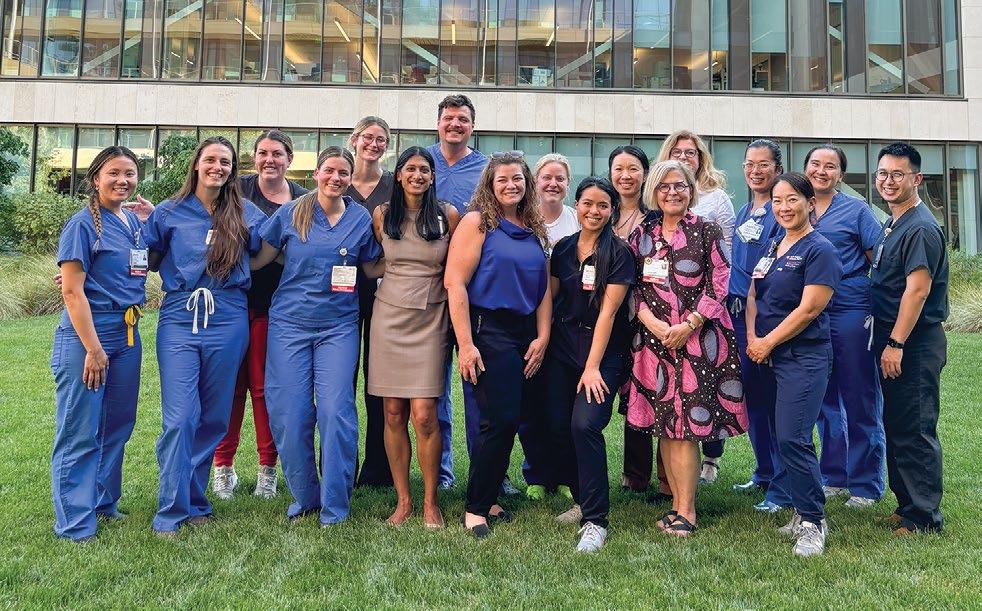
2024 APP Fellows, Raji Koppolu sixth from left
MSN, RN, NPD-BC, then Manager – Transition to Practice. Our success reflects the diverse and multidisciplinary efforts supporting our nurse practitioners, physician assistants, and new graduate nurses.

Annette Nasr, RN, PhD, MPA, NE-BC, FAAN, has been recognized as a Fellow of the American Academy of Nursing (AAN). This accolade highlights Annette’s exceptional expertise, leadership, and dedication to the nursing profession. Her recognition as an AAN Fellow is a milestone celebrating her commitment to advancing health care.
Kim Pyke-Grimm, PhD, RN, CNS, CPHON, received the 2024 Association of Pediatric Hematology/Oncology Nurses (APHON) Early Career Researcher Award recognizing her work as a Nurse Scientist. This honor reflects Kim’s accomplishments and promising future as an independent Nurse Scientist conducting high-impact research positively impacting children and adolescents with cancer and blood disorders and their families.
The inaugural Bass Center Wellness Education Day for Pediatric Caregivers was designed to help attendees learn valuable tools and techniques to enhance their own wellness while caring for loved ones.
At the end of September, the Stanford campus became a sanctuary for caregivers of children with cancer, blood, and immunological disorders as they gathered for a day dedicated to their wellness. Two nurses within the Bass Center for Childhood Cancer and Blood Diseases, Veronica DeRosa, BSN, RN, CBC, NC-BC, Pediatric Stem Cell Transplant Nurse Coordinator, and Sarah Simmons, BSN, RN, Foundation for the Accreditation of Cell Therapy Quality Specialist, recognized the immense sacrifices caregivers make and created this event as a heartfelt acknowledgment of their need for self-care tools and moments to rest and recharge. The Bass Center Wellness Education Day was designed to empower attendees with vital tools and techniques to enhance their well-being while managing the demands of caring for loved ones. The day-long event offered a diverse range of sessions including stress management, yoga, parent-child communication tips, art therapy, meditation, and movement practices.
Health care traditionally focuses on the patient, leaving caregivers on their own to process the stressors and life changes that come with a child’s diagnosis. Veronica
and Sarah designed this event to address these needs, showing caregivers that they are seen and supported. This gathering was not just about learning; it was about finding solace and community, providing caregivers a space to breathe, connect, and feel supported.
This gathering … was about finding solace and community, providing caregivers a space to breathe, connect, and feel supported.
Veronica and Sarah hope to provide ongoing support for caregivers through quarterly wellness sessions in addition to an annual event. Their commitment to providing tools and resources to support the emotional health of caregivers truly embodies Stanford Medicine Children’s Health’s vision to heal humanity through science and compassion, one child and family at a time.
The Virtual Nursing Pilot merges technology and compassionate support to revolutionize patient care.
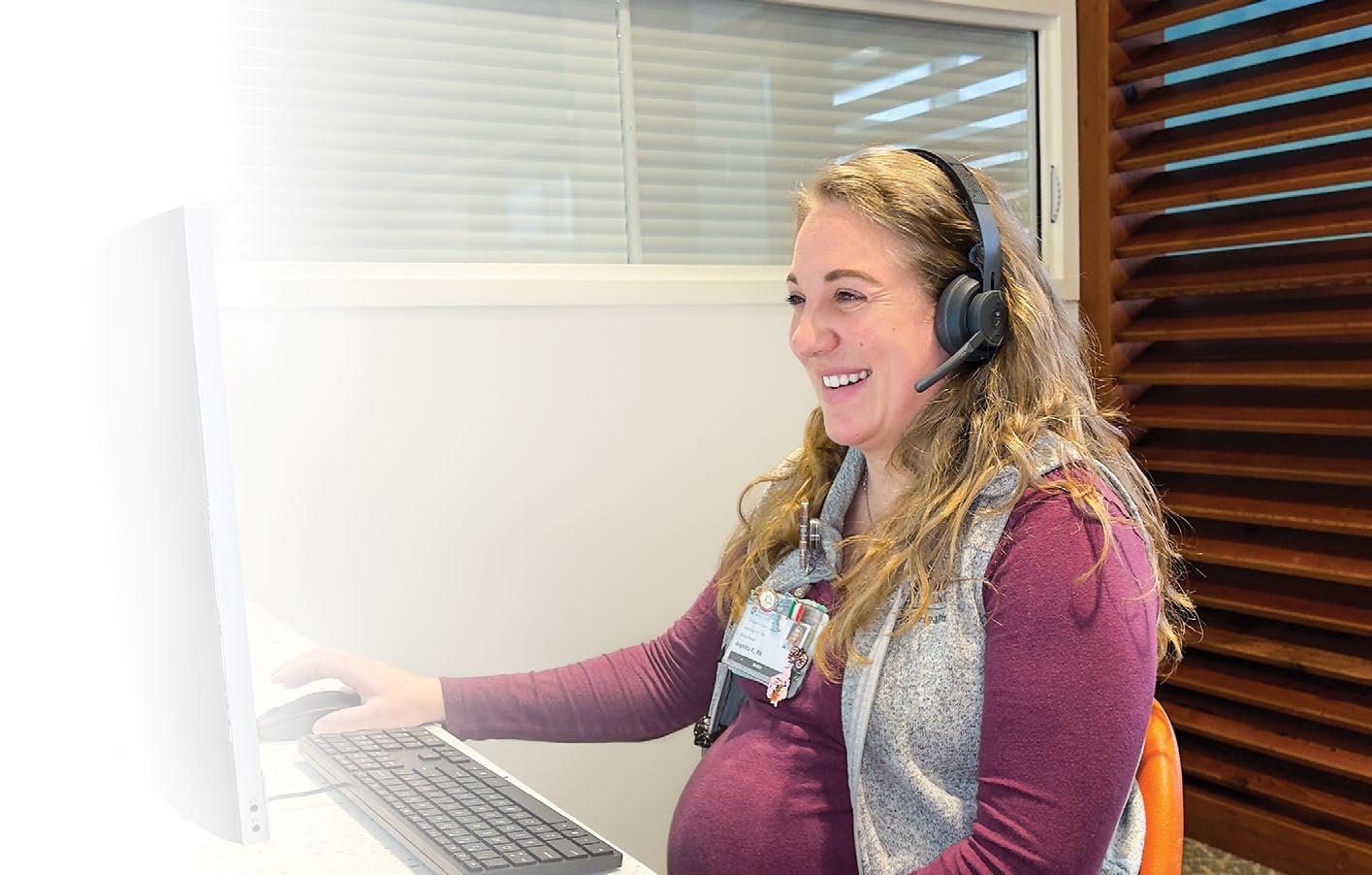
Stanford Medicine Children’s Health has embarked on an innovative path to enhance patient care with the launch of the Virtual Nursing Pilot on PCU 360. Led by Carmela Junio, RN, BSN, MSN, Manager of Nursing Informatics & Innovation Center, this project is a collaboration between Nursing and Digital Information Solutions (Digi-IS). The initiative leverages trained nurses to support bedside staff virtually with tasks like documentation. The aim is to free up the bedside nurse to focus on more direct patient care, boosting efficiency and overall satisfaction.
Inpatient admissions are inherently busy, with the bedside nurse juggling competing priorities and interruptions. Traditionally, completing admission documentation can take over 40 minutes. However, our pilot virtual nurses can accomplish this task in just 15 minutes, allowing the bedside nurse to concentrate on other aspects of quality care.
The vision is to expand the scope of virtual nursing to include additional support tasks across various units. Potential roles include assisting with patient education, second nurse checks, and discharges, envisioning a future where virtual nurses seamlessly integrate into various facets of patient care.
The Virtual Nursing Pilot exemplifies the organization’s commitment to innovation and excellence. By embracing cutting-edge technology, we are setting new standards for delivering compassionate, efficient, and highquality health care.
Traditionally, completing admission documentation can take over 40 minutes … with virtual nurses, this task is accomplished in just 15.
The Nursing Research and Evidence-Based Practice (EBP) Fellowships aid nurses in developing and conducting a clinically focused research study or implementing an EBP project. Fellows receive protected time to complete their study/project and support with presenting their findings through conferences or publications.
Jenna Murray, RN, CPNP-AC, MPH, Cardiology
Laurel Kent, RN, MSN, FNP, Bass Center
Amelia Sperber, DNP, RN, CNS, CPNP-PC, CPE&I
Rebecca Patey, RN, BSN, RNCNIC and Jocelyn Lazaro RN, MSN, CNL, CPN, PCU 300
Madison Courtad, RN, BSN, Labor & Delivery

Caring for a child’s gastrostomy tube (G-tube) can be daunting at first. However, with the right support and education, families can confidently manage this new aspect of care.
G-tube placement is a common procedure for children facing long-term feeding difficulties. Deanna Garza, DNP, RN-BC, CWCN, Clinical Nurse IV, Wound Care, led a study highlighting the crucial role that health care
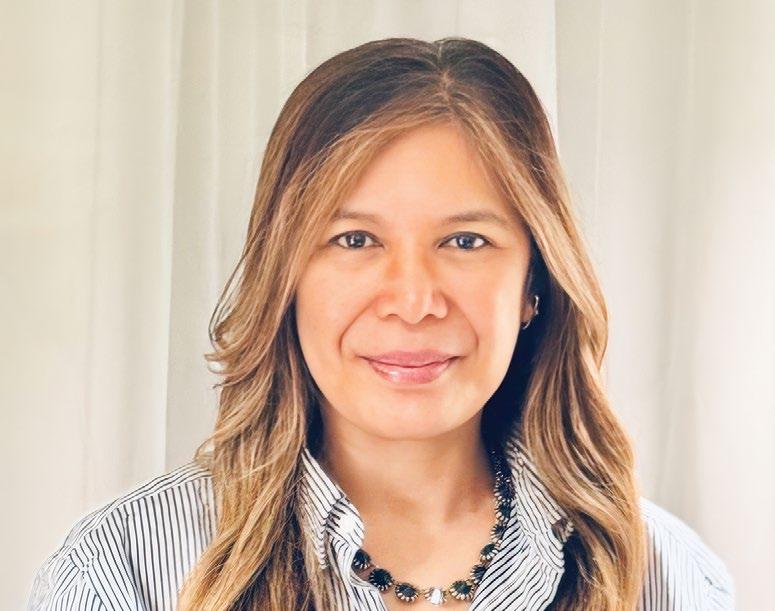
Deanna Garza, DNP, RN-BC, CWCN
providers play in supporting families through this transition, especially during the early weeks after surgery.
Dr. Garza and her research team engaged with 21 health care professionals (HCPs), including
gastroenterologists, nurses, dietitians, and case managers, to gather their insights on caregiver education and support. Three key themes emerged: Staff Education and Training, Patient and Family Education, and Hospital-to-Home Transition.
HCPs recognized that caregivers often feel overwhelmed by the wealth of information delivered during a hospital stay. They emphasized the importance of phased and hands-on learning approaches to help caregivers retain essential information, as well as accessibility to resources after discharge. These findings highlight the significance of standardized education protocols. Research indicates that well-structured discharge education can reduce the likelihood of unexpected hospital visits by 30%. By equipping families and HCPs with the necessary tools and knowledge, we enhance the care provided to children with G-tubes.
At Stanford Medicine Children’s Health, we are committed to ensuring that every family feels confident and empowered in their role as caregivers.
Dr. Garza’s research aligns with our values to collaborate, advance, respect, educate, and serve.
Research Mentor: Kim Pyke-Grimm, PhD, RN, CNS, CPHON. This study was supported by a Stanford Alumnae Legacy Grant.
The Outstanding With Literature (OWL) Award recognizes Stanford Children’s nurses and advanced practice providers (APPs) who have published their research and evidence-based practice in a book or peer-reviewed journal or presented at a local or national conference. Boldface italicized names indicate the recognized nurses and APPs.
Alden, A., Price, E., & Ramirez, A. (2024). Revamping the approach to quality and process improvement in the CVICU. Pediatric Cardiac Intensive Care Society Annual International Meeting.
Ardaya, A., Thakker, N., Teufel, B., Nigh, A., Keogh, M., Sacks, L., & Shin, A. (2024). Rapid-cycle improvements from a real-time mortality review process is associated with improvements in cardiac surgical mortality rates. Pediatric Cardiac Intensive Care Society Annual International Meeting.
Armstrong, A., Liang, J., Char, D., Hollander, S. A., & Pyke-Grimm, K. A. (2024). The effect of socioeconomic status on pediatric heart transplant outcomes at a single institution between 2013 and 2022. Western Institute of Nursing Conference.
Chan, C. (2024). Advancing preventive care through clinical decision support: Current concepts in advanced practice. Current Concepts in Advanced Practice Conference, Virtual. Chan, C. (2024). Capturing APP productivity. Current Concepts in Advanced Practice Conference, Virtual.
Cheslow, A., & Schmidt, M. (2024). Utilizing ultrasoundguided peripheral intravenous line (USPIV) techniques to elevate professional practice in pediatrics. Infusion Nurses Society Annual Meeting.
Damian, M., Orlandi-Maurer, P., Powers, M., Hess, C., Kwalick, B., & Balakrishnan, K. (2024). Preop patient conference: A QI pilot launch. American College of Surgeons Quality & Safety Conference.
DelaCruz, C., Ryan, K., Jahadi, O., & Kollmann, S. (2024). Cannula cart: Streamlining ECMO deployment and supply management with comprehensive cannula integration. 35th Annual Extracorporeal Life Support Organization Conference.
Fahs, C., & Pattison, J. (2024). Learning from setbacks and reinvesting in lean tools for positive staff engagement in goal deployment. Lean Health Care Academic Conference.
Garza, D., Abrajano, C., Lew, E., & Pyke-Grimm, K. A. (2024). Educational needs of those caring for children with a g-tube: Qualitative study of health care providers. Sigma Region 1 International Nursing Conference.
Kirby, K., & Byrne, E. (2024). Introducing the cardiac iRainbow: A developmental care path for infants in the cardiac intensive care setting.
37th Annual Gravens Conference: The Environment of Care for High Risk Newborns.
Koppolu, R., Abels, L., Moore, E., Ring, L., Swerdlin, R., & Williams, K. (2024). Advanced practice professional development and education leadership roles in children’s hospitals. National Association of Pediatric Nurse Practitioners 45th National Conference on Pediatric Healthcare.
Lagunilla, B., & Morgan, M. C. (2024). Optimizing prior authorization workflows in outpatient clinics: A comprehensive approach. Sigma Region 1 International Nursing Conference.
Lin, H. (2024). The heart of nursing: A global perspective on surgical missions. Association of periOperative Registered Nurses Southeastern Regional Conference.
Lin, H. (2024). The future of nursing: COVID edition. Perioperative Patient Safety Seminar & 3rd Mini-Convention.
Lin, H. (2024). Collaborators in care—The role of the advanced practice provider in a microtia practice. 3rd Congress of the International Society of Auricular Reconstruction.
Lin, H., Jones, N., Peneza, D., Raymond, O., & Yau, S. (2024). So, you want to be a leader? Make your mark. Association of periOperative Registered Nurses Global Surgical Conference & Expo.
Long, S., Moreno, C., & Nasr, A. (2024). A four-step evidence-based pushing protocol. 35th Annual International Sigma Theta Tau Nursing Research Congress.
McCabe, L. (2024). A unique peritonitis case presentation: You cat to be kitten me! Standardizing Care to Improve Outcomes in Pediatric End Stage Kidney Disease Spring Conference.
Meissbach, S., & Chapman, A. (2024).
STARring a multi-disciplinary approach to practice change in acute care. Sigma Region 1 International Nursing Conference.
Nasr, A. S. (2024). Boosting nursing research capacity by creating a collaborative interprofessional funding opportunity: A nurse scientist initiated program at a leading pediatric academic medical center. American Nurses Credentialing Center National Magnet Conference.
Nasr, A. S. (2024). A qualitative exploration of family resiliency in pediatric living-related donation. 30th International Congress of The Transplantation Society.
Nasr, A. S. (2024). A family-centered approach to understanding parental and adolescent perspectives on live liver donation. 28th Annual Meeting of the Society of Pediatric Liver Transplantation.
Nasr, A. S. (2024). A family-centered approach to understanding parental and adolescent perspectives on live liver donation. 49th North American Transplant Coordinators Organization Annual Meeting.
Pyke-Grimm, K. A., Bjork, I., & Spunt, S. (2024). Parental and young adult perspectives on genetic tumor profiling: A qualitative study. Western Institute of Nursing Conference.
Pyke-Grimm, K. A., Brown, M., Youssef, A., Spengler, M., Hollander, S., Feudtner, C., & Char, D. (2024). Compassionate deactivation of pediatric ventricular assist devices: Clinician perspectives and experiences. Advancing Perinatal, Pediatric Palliative, and End-of-Life Care with ELNEC.
Pyke-Grimm, K. A., Tate, T., & Burford, A. (2024). Ethical/legal issues in pediatric palliative care. Advancing Perinatal, Pediatric Palliative, and End-ofLife Care with ELNEC.
Rivera, K., & Punla, M. (2024). Skills fair addressing confidence level in new nurses. Vizient/AACN Nurse Residency Program Conference.
Ruccione, K., & Pyke-Grimm, K. A. (2024).
Implementing recommendations for return of results within the children’s oncology group: A model for returning study results. Association of Pediatric Hematology/Oncology Nurses Annual Conference.
Smedley, L. (2024). Us vs. them: Why “we” always wins. Synova Perinatal Leadership Forum.
Smedley, L., Satran, L., & Haggard, D. (2024). Navigating leadership transitions. Synova Perinatal Leadership Forum.
Steidley, E. (2024). Managing risk on deployment. Air Force Reserve Command Mental Health Symposium.
Taylor, K., & Orlandi, A. (2024). Nurse executive council (ultimate authority). American Nurses Credentialing Center National Magnet Conference.
Tucker, C. M., Carvalho-Magalhães, M., Jalloh, R., Calix, I., Phung, B., Carmichael, S., & Lyndon, A. (2024). A qualitative study identifying improvement opportunities in care for those experiencing life-threatening complications during pregnancy and birth. Council for the Advancement of Nursing Science State of the Science Congress on Nursing Research.
Wintch, S., & Sinkula, S. (2024). Communication with “difficult” families. Society of Pediatric Sedation Conference.
Publication in a Book or Peer-Reviewed Journal
Armstrong, A., Liang, J. W., Char, D., Hollander, S. A., Pyke-Grimm, K. A. (2024). The effect of socioeconomic status on pediatric heart transplant outcomes at a single institution between 2013 and 2022. Pediatric Transplantation, 28(2), e14695.
Bowdish, E. (2024). A quiet place. Academic Medicine, 99(10), 1090–1091.
DelaCruz, C., Ryan, K., Jahadi, O., & Kollmann, S. (2024). Enhanced ECMO deployment and supply management system with cannulation strategy integration. ASAIO Journal, 70(4), 65.
Hansen, K., Jenkins, E., Zhu, A., Collins, S., Williams, K., Garcia, A., Weng, Y., Kaufman, B., Sacks, L., Cohen, H., Shin, A., & Patel, M. (2024). A parental communication assessment initiative in the paediatric cardiovascular ICU. Cardiology in the Young, 34(9), 1912–1920.
Koppolu, R., Van Graafeiland, B., & Hansen, B. R. (2024). Outcomes of pediatric-focused advanced practice provider fellowship programs: An integrative review. Journal of the American Association of Nurse Practitioners, 36(9), 504–511.
Lemas, D. J., Du, X., Rouhizadeh, M., Lewis, B., Frank, S., Wright, L., Spirache, A., Gonzalez, L., Cheves, R., Magalhães, M., Zapata, R., Reddy, R., Xu, K., Parker, L., Harle, C., Young, B., Louis-Jaques, A., Zhang, B., Thompson L., Hogan, W. R., & Modave, F. (2024). Classifying early infant feeding status from clinical notes using natural language processing and machine learning. Scientific Reports, 14(1), 7831.
Lestishock, L., Cuomo, C., Hickam, T., JohnsonHooper, T., Maddux, M., Muzzall, E., McManus, M., & White, P. (2024). Self-perceived importance and confidence of adolescents transitioning to adult care. Health Care Transitions, 3(100086).
Levoy, E., Vilendrer, S., Dang, R., Nasr, A. S., Luu, J., Tawfik, D., & Shanafelt, T. (2024). Physician perspectives of clinical performance feedback and impact on well-being: A qualitative exploration. BMJ Open, 14(e082726).
Liang, N. E., Alvarez, K., Dalusag, K., Chan, K., Bunnell, B., Stroud, M., Steele, K., & Chau, S. D. (2024). Beyond physical injury: Routine screening for acute stress disorder and posttraumatic stress disorder in pediatric trauma patients—A longitudinal cohort pilot study. Journal of Pediatric Surgery, 0(0), 161982.
Liesse, K. M., Malladi, L., Dinh, T. C., Wesp, B. M., Kam, B. N., Turturice, B. A., Pyke-Grimm, K. A., Char, D. S., & Hollander, S. A. (2024). Trajectories in intensity of medical interventions at the end of life: Clustering analysis in a pediatric, single-center retrospective cohort, 2013–2021. Pediatric Critical Care Medicine, 25(10), 899–911.
Ma, M., Masterson, E. E., Gao, J., Karpel, H., Chan, A., Pooni, R., Sandberg, J., Rubesova, E., Farhadian, B., Willet, T., Xie, Y., Tran, P., Silverman, M., Thienemann, M., Mellins, E., & Frankovich, J. (2024). Development of autoimmune diseases among children with pediatric acute-onset neuropsychiatric syndrome. JAMA Network Open, 7(7):e2421688.
Magana-Soto, J. N., Ruiz, M. O., Tawfik, D. S., ReyArdila, D., Bonillas, A., Persoglia-Bell, M., Su, F., & Anand, K. J. S. (2024). Unit-based Pathways to Reduce InequitieS for familiEs speaking languages other than English (UPRISE). Hospital Pediatrics, 14(9), 773–781.
Margallo, D., Walker-Vischer, L., & Godin, M. (2024). How implementing a digital competency management system reduced nurse training cost and improved NPD practitioner satisfaction in a pediatric hospital. The Journal of Continuing Education in Nursing, 55(5), 239–245.
Rafferty, T., Koeppen-Babcock, A., Muppidi, S., Li, Y., & Le, S. (2024). Utilization of APE2 and RITE2 scores in autoimmune encephalitis patients with seizures. Epilepsy & Behavior, 154, 109737.
Tong, J. H., Manipon, C., Vallandingham-Lee, S., Dasani, R., Davis, A. S., & Bhombal, S. (2024). The role of neonatal nurse practitioners in the implementation of a bedside point-of-care ultrasound program. Advances in Neonatal Care, 24(6), 536–543.
Wright, S. L., Low, C., Scribner, C., Chong, A., & Seligman, A. (2024). The value of international exchange programs for physician assistants: Surveying a US-Netherlands advanced practice provider exchange program. The Journal of Physician Assistant Education, 35(4), 419–424.